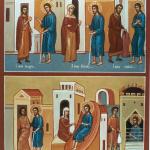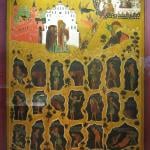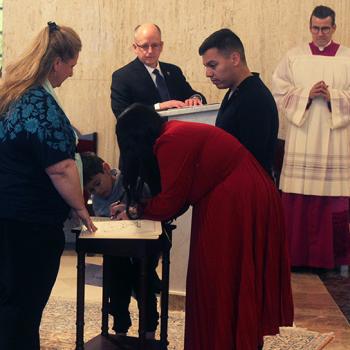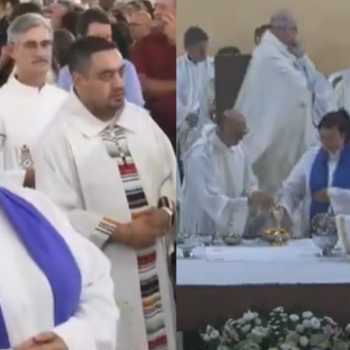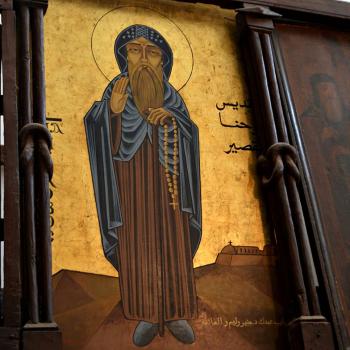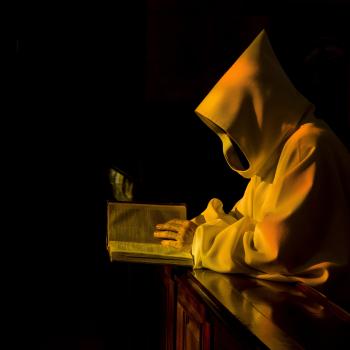
Sin corrupts and destroys that which is good, which is why, when we sin, we experience what is often described as “spiritual death.” For, when we sin, we attach ourselves to a lesser good, an attachment which gets in the way of our connection to the source and foundation of our being and to our spiritual vitality. That is, it interferes in our connection with God. Without that connection, our spirit suffers, so that, in a way, we can be described as one of the “living dead” or the undead, though not in the way of horror stories where there is a spiritual force behind a dead body, but rather, in the way there is a living body which finds itself disconnected from its own spiritual center.
The potential of sin is limited. It does not have any power of its own. Its power lies in the good which it attaches itself to and on which it feeds to give it the semblance of life; as it feeds (like a parasite) the good it attaches itself to is slowly diminished (or corrupted), until, at last, if sin were not stopped, the good it used would be destroyed, and without having anything to sustain itself, the sin would also vanish, leaving nothing but a void in its place. This corruption is a corruption of the being of the good, its spiritual integrity, the effect of which will be felt on all levels of being, including and especially in the material world.
Grace can heal the damage caused by sin. Those who turn away from sin, those who repent, and open themselves up to grace will be “brought back to life.” However, they should remember from whence they came, the sins which they have committed, and the forgiveness which they received, so that they do not abandon one sin for something far graver and sinister, that is, pride. For those who forget will easily be led to think greatly of themselves and treat others poorly due to their pride, until at last, they will think they are great enough to judge and condemn those who are not like them.
The one who has received grace should let it transform them and lead them to follow the way God wants them to go, that is, the way of love. They should deny the promptings or suggestions of unlove, those which would have them undermine the goodness of others. They should look to others in and with the eyes of love, discerning the good which lies in them, so that they will end up willing to defend their neighbor if it is ever needed. The more love has transformed them, the more they will defend the dignity of their neighbor, even if it means they will have to suffer some sort of indignity themselves in order to do so. For, as Jesus said, the greatest love is found in those who are willing to put themselves in danger, indeed, die, for their beloved, which, Abba Poemen suggests, means we would rather die for the sake of their dignity than to unjustly judge and condemn them ourselves:
I heard a brother asking Abba Poemen about some matter, and Abba Poemen said: ‘If a man who is alive is willing to do so, he may die rather than blame his brother.’[1]
This is the way of love, the way which Christians, not just monks, are called to embrace. Abba Poemen goes beyond telling us not to judge our neighbor, but we should defend them, even if it means in the end, we suffer greatly for doing so. That is how far we should take our commitment to our neighbor. It is a tough lesson, especially as we must balance it with practicality, when we find ourselves in the middle of many people who are in conflict with each other, with some, if not all of them, acting unjustly and causing great harm to others. We will have to find a way to correct them and stop them from acting unjust without undermining their own human dignity. That is, we must take the expectations of justice into consideration, and when we do so, we will end of defending those who are being unjustly hurt, doing what we can to make those who are committing grave injustice stop what they are doing and make reparations for what they have done. What is important is that we do not go around looking for people to judge, people to condemn; rather, we should be looking for those who need our love, those who are suffering, those who have had their human dignity undermined, and find a way to get the help they need.
Perhaps, with this way of thinking and dealing with others, embracing their human dignity while promoting justice, we can better understand a rather enigmatic saying of Poemen, where he mentions what must be remembered about our relationship with others is the good found in it, not the bad:
Abba Poemen said: ‘If a man has died because of his sins, he is then dead for the entire world, [then] in order that he not torment himself for all the days of his [new] life, he should not forget the good things between him and his brother.’[2]
Those who seek to blame their brother or sister follow the way of sin, the way of destruction, as it leads them to ignore the good in their brothers and sisters. The way of love is the way of grace, the way of taking that which is good, embracing it, lifting it up, and helping it come to its perfection. Sin destroys uses up and destroys that which is good; those who constantly seek to blame others only undermine the good in them and so do the bidding of sin. They do not know how to see the good in the world, which is why the spiritual death of sin can be said to be a kind of death to the world, for they are unable to see and experience the world for what it truly is, with the goodness contained in it. They instead experience the world through the veil of sin, a veil which creates an illusory world, a false world, one which tries to enchant the viewer and have them embrace the fantasy. When many spiritual writers talk about “death to the world,” or being detached from it, they do not mean the world as it is in the goodness given to it by God, but rather, this illusory, false world, just as “death to the self” is about the destruction of the false, illusory self so that the good person masked by it can be set free. We die to the false world to find ourselves restored to the world as it really is so then we can find the good in it and embrace it in the way appropriate to that good. This is what the Gnostics did not understand, as their denial of the world was an absolute denial, not only of the illusion, but the good which the illusion covered; the way of Christianity is the way of the incarnation, the way of unveiling and embracing that good, setting it free so it can thrive. Let us, therefore, die to the false world and find ourselves alike in the true one, for when we do, we will then find ourselves in the kingdom of God.
[1] More Sayings of the Desert Fathers. An English Translation And Notes. Ed. John Wortley (Cambridge: Cambridge University Press, 2019; repr. 2023), 156 [“Sayings Preserved in Ethiopic”: E48].
[2] More Sayings of the Desert Fathers. An English Translation And Notes, 156 [“Sayings Preserved in Ethiopic”: E45].
Stay in touch! Like A Little Bit of Nothing on Facebook.
If you liked what you read, please consider sharing it with your friends and family!
N.B.: While I read comments to moderate them, I rarely respond to them. If I don’t respond to your comment directly, don’t assume I am unthankful for it. I appreciate it. But I want readers to feel free to ask questions, and hopefully, dialogue with each other. I have shared what I wanted to say, though some responses will get a brief reply by me, or, if I find it interesting and something I can engage fully, as the foundation for another post. I have had many posts inspired or improved upon thanks to my readers.


